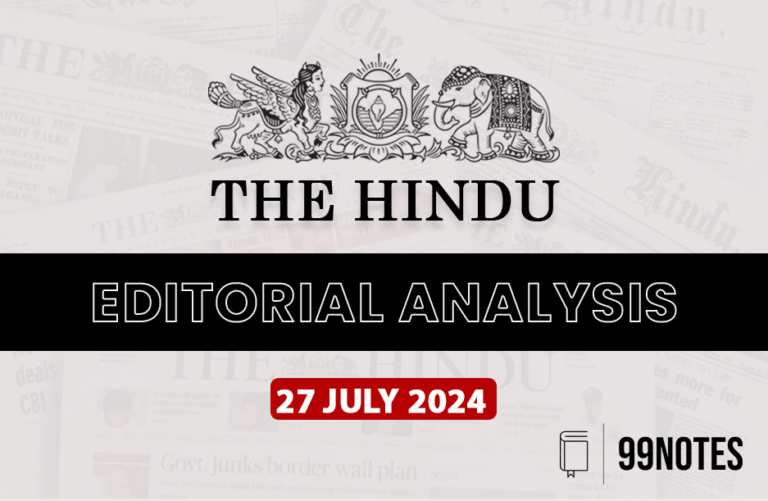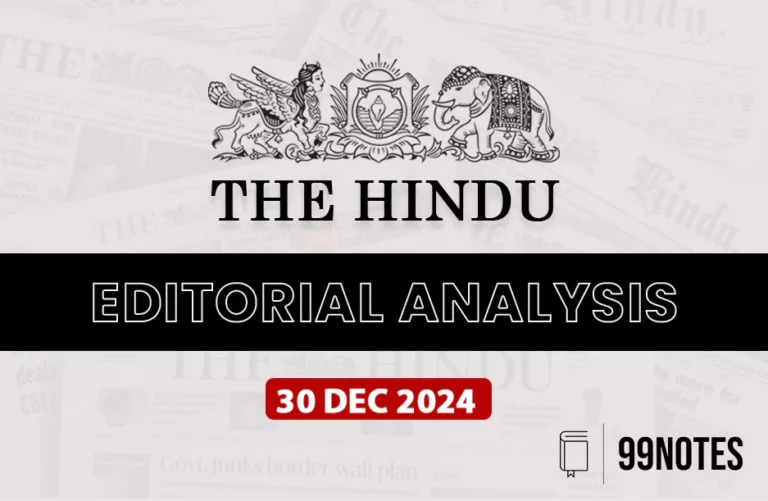30 October 2023 : The Hindu Editorial Notes PDF
The Hindu Editorial
30-October-2023
1. Give up impropriety, demonstrate impartiality.
Topic: GS2 – Indian polity.
Role of the Chief Justice of India
- Chief Justice of India expresses concern over the inaction of the Maharashtra Assembly Speaker in handling disqualification petitions of its members.
- Emphasizes the importance of following court orders and maintaining the dignity of the court.
Historical Background of the Speaker’s Office
- The role of the Speaker’s office originated in medieval Britain to act as a spokesman for the House of Commons in dealings with the King.
- Over time, the Speaker evolved into an impartial Chairman of the House of Commons, responsible for safeguarding the rights and privileges of the House, its committees, and its members.
Speaker’s Functions in India
- In India, the Lok Sabha and Legislative Assemblies elect a Speaker and Deputy Speaker.
- Speakers have two crucial roles: certifying Bills as Money Bills and deciding on disqualifications under the Tenth Schedule for defection.
- Often, Speakers and Houses misuse suspension provisions against opposition members.
- Instances of uneven actions, such as swift suspension of an opposition leader and delayed action against a ruling party member, have been observed.
- The Speaker is authorized to refer Bills to Parliamentary Standing Committees, but fewer Bills have been referred in recent years, impacting parliamentary functioning.
Challenges with Disqualification Decisions
- The Speaker’s authority to decide on disqualifications has been a point of contention. Past instances show a bias towards the ruling party.
- Calls for amending the Constitution to create an independent tribunal, headed by judges, for handling disqualification cases.
- Current indictment of the Maharashtra Assembly Speaker is due to inaction on disqualification petitions despite court directives.
- Challenges in the court against the Speaker’s certification of Bills as Money Bills have also emerged.
The Impartial Role of the Speaker
- In Britain, the Speaker resigns from their political party upon election and seeks re-election as an impartial Speaker.
- In India, no Speaker has followed this practice despite the provision allowing them to resign from their party.
- The higher judiciary has limited authority in dealing with Speaker-related issues.
- Encouragement for Indian Speakers to adopt practices that instill confidence in their impartiality and uphold democratic principles.
Conclusion:
In conclusion, the impartiality and responsible conduct of Speakers in India’s legislative bodies are vital for upholding democratic values and ensuring the fair functioning of the parliamentary system.
Question: To what extent do the actions and decisions of Speakers in the Indian parliamentary system impact the functioning of democracy and governance? Propose reforms to enhance the role and impartiality of Speakers for better parliamentary outcomes.
2. An unfolding economic tragedy
Topic: GS3 – Indian economy.
GDP-Centric Celebration:
- India’s GDP growth, touted as the fastest-growing major economy, is widely celebrated.
- The euphoria over GDP growth masks deeper issues within the Indian economy, including inequality, job scarcity, poor education, and environmental damage.
Weakening GDP Growth:
- Contrary to the hype, India’s GDP growth has significantly slowed over the past two decades.
- Weak mass demand has been a major problem, leading to a drop in private corporate fixed investment.
Pre-COVID and Post-COVID Growth:
- India experienced high GDP growth in the mid-2000s, but it was unsustainable due to various factors.
- The slowdown in GDP growth was exacerbated by factors such as demonetization, the GST rollout, and financial sector challenges.
Assessing Post-COVID Growth:
- The post-COVID economic performance has been inconsistent, with periods of recovery followed by slowdowns.
- Demand weakness is evident in the decline in private corporate investment and rising household debt.
Need to Bolster Demand:
- Government policies have primarily focused on increasing supply rather than addressing the demand side through job creation, human capital investment, and infrastructure development.
- Increased reliance on indirect taxes has further eroded purchasing power and aggravated demand issues.
Medium-Term Growth Forecast:
- A realistic assessment suggests a medium-term GDP growth forecast of 3%-4%.
- The mismatch between narrative and economic reality can lead to serious consequences for the nation.
Conclusion:
India’s fixation on GDP growth as a measure of success obscures underlying economic challenges, including demand weakness, inequality, and job scarcity. Realistic growth expectations should guide policy decisions to address the nation’s needs effectively.
Question: How has India’s overreliance on GDP growth as an economic metric impacted the country’s development, and what measures can be taken to address underlying economic challenges?
3. The ED has failed to demonstrate its impartiality in its probes
Topic: GS2 – Indian polity.
Context:
- Enforcement Directorate (ED) actions at the premises of Rajasthan Congress president Govind Singh Dotasra and independent MLA Om Prakash Hudla have raised accusations of selective targeting of Opposition leaders.
- Critics argue that the ED’s actions seem to target only Opposition-ruled states and leaders opposed to the BJP, raising questions about the agency’s impartiality and even-handedness.
- Large-scale defections of elected representatives to the BJP have occurred, which contradicts the claim that corruption is solely prevalent in Opposition-ruled states.
Significance of impartiality in case of independent bodies:
Impartiality is the bedrock on which the effectiveness and credibility of independent bodies rest. These organizations, free from political interference and vested interests, play pivotal roles in various aspects of governance. Their significance in upholding the rule of law, transparency, and accountability cannot be overstated.
Preserving the Rule of Law
Impartiality ensures that independent bodies uphold the rule of law without fear or favor. They act as guardians of justice and fairness, making decisions based on evidence, legal principles, and established procedures. This helps maintain the trust of citizens in the legal system and prevents the abuse of power.
Enhancing Transparency and Accountability
Independent bodies are responsible for overseeing government actions, investigating misconduct, and ensuring public institutions operate transparently and responsibly. Their impartiality is paramount in scrutinizing those in power, as it guarantees unbiased assessments of governmental actions.
Promoting Public Trust
Impartiality fosters public trust in the decisions and recommendations of independent bodies. When citizens believe that these organizations are free from bias, they are more likely to accept their findings and adhere to their directives, which is vital for a functioning democracy.
Preserving Democracy
Independent bodies are integral to the democratic system, as they provide a system of checks and balances. Their impartiality is a safeguard against authoritarianism and ensures that the government remains accountable to the people.
Conclusion:
The impartiality of independent bodies is not just a desirable trait; it is essential for their roles in preserving the rule of law, enhancing transparency and accountability, promoting public trust, and ultimately safeguarding democracy.
Question: How does the principle of impartiality contribute to the effectiveness of independent bodies, and why is it crucial for upholding the rule of law and democracy?
For Enquiry

30 October 2023 : The Hindu Editorial Notes PDF

28 Oct 2023 : Daily Quiz

28 Oct 2023 : Daily Answer Writing

28 Oct 2023 : Indian Express

28 Oct 2023 : PIB

28 October 2023 : Daily Current Affair

28 October 2023 : The Hindu Editorial Notes PDF

27 Oct 2023 : Daily Quiz

27 Oct 2023 : Daily Answer Writing

27 Oct 2023 : Indian Express
October 2023 The Hindu 30 October 2023 : The Hindu Editorial Notes PDF The Hindu Editorial
30-October-2023
1. Give up impropriety, demonstrate impartiality.
Topic: GS2…
Daily Quiz 28 Oct 2023 : Daily Quiz 28 Oct 2023 : Daily Quiz…
mains answer writing 28 Oct 2023 : Daily Answer Writing Mains Answer Writing
28-october-2023
1. Discuss the key function of the Public Accounts Committee (PAC)….
Indian Express 28 Oct 2023 : Indian Express Indian Express
28-October-2023
1) Rising Concerns of Political Deep Fakes
Context:
The problem of…
October 2023 PIB 28 Oct 2023 : PIB PRESS INFORMATION BUREAU
28-Oct -2023
1. Need to strike a delicate balance between development and…
Daily Current Affairs 28 October 2023 : Daily Current Affair Daily Current Affairs
28-October-2023
1. Pursue all legal, political options in Qatar case, say experts.
Topic:…
October 2023 The Hindu 28 October 2023 : The Hindu Editorial Notes PDF The Hindu Editorial
28-October-2023
1. Women can make the world better.
Topic: GS3 – gender…
Daily Quiz 27 Oct 2023 : Daily Quiz 27 Oct 2023 : Daily Quiz…
mains answer writing 27 Oct 2023 : Daily Answer Writing Mains Answer Writing
27-october-2023
1. Highlight the key differences in the scope of Freedom of speech…
Indian Express 27 Oct 2023 : Indian Express Indian Express
27-October-2023
1) WARMING UP, BREAKING THE ICE
Context:
Being the host of the G20…



